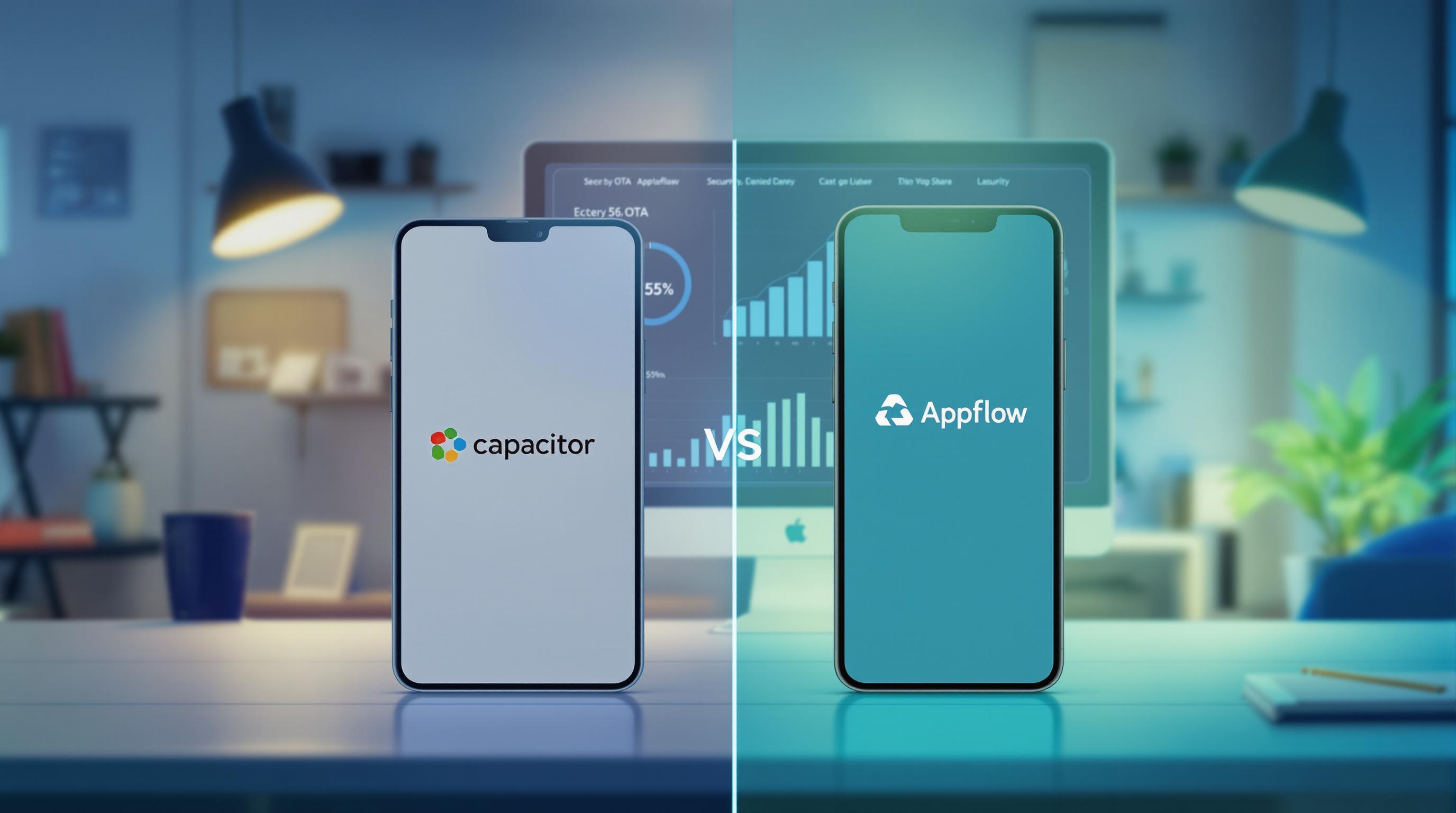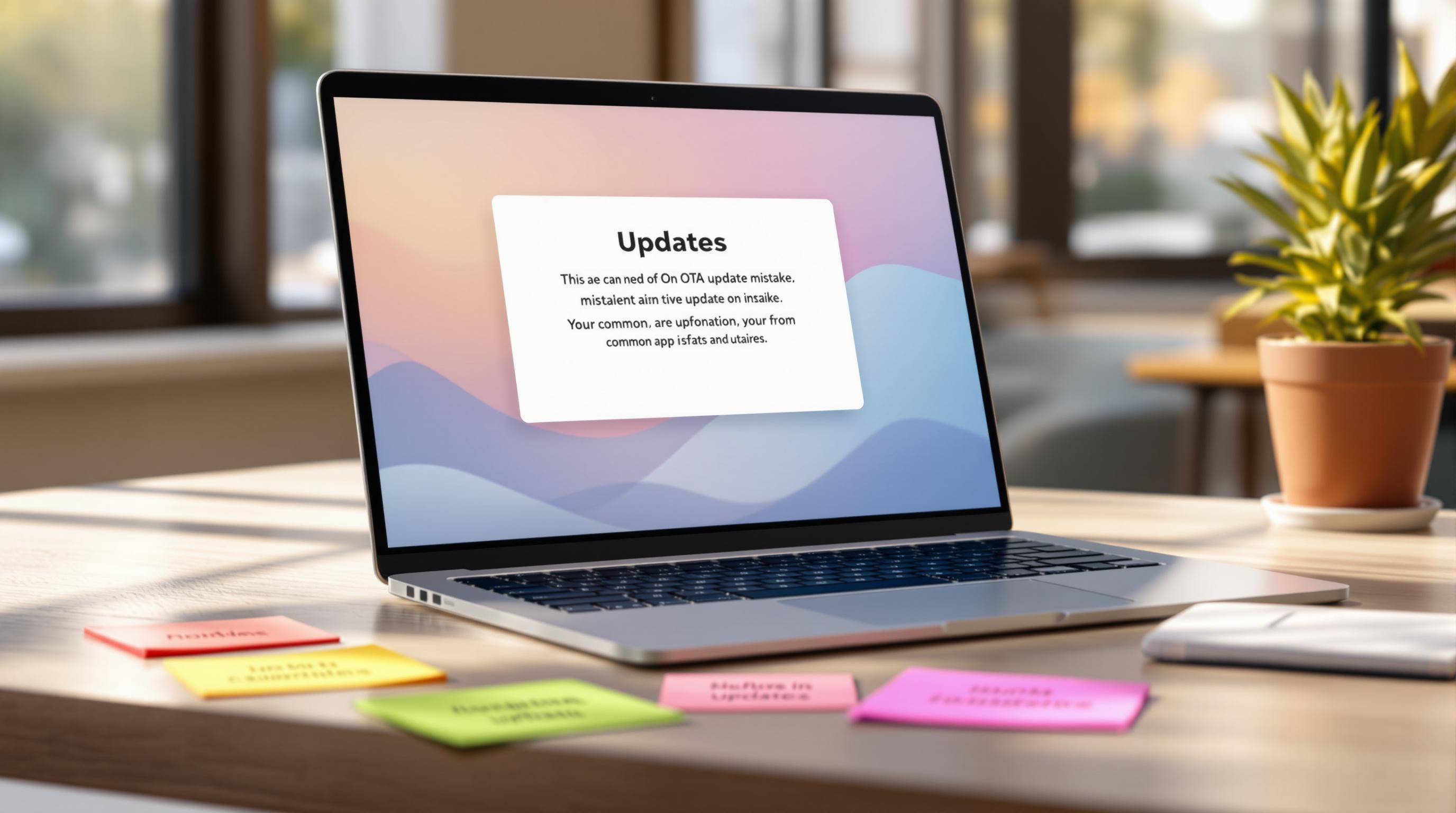Looking for the best OTA update solution for your app? Here’s a quick comparison of Capacitor (with Capgo) and Appflow to help you decide. Capacitor offers fast updates, high security, and cost-effective options, while Appflow is tied to the Ionic ecosystem and is set to shut down in 2026.
Key Points:
-
Capacitor (Capgo):
- Updates reach 95% of users in 24 hours.
- Offers end-to-end encryption and flexible hosting (cloud or self-hosted).
- OTA updates from $12/month ($144+/year). Optional CI/CD setup service for native builds available for $2,600 one-time.
- Actively developed and open-source.
-
Appflow:
- Integrated with Ionic but cloud-only.
- Scheduled to end support in 2026.
- Costs $6,000 annually.
Quick Comparison:
| Feature | Capacitor (Capgo) | Appflow |
|---|---|---|
| Update Speed | 95% in 24 hours, 434ms API | Varies |
| Security | End-to-end encryption | Standard signing |
| Hosting | Cloud or self-hosted | Cloud-only |
| Future Availability | Actively developed | Ends in 2026 |
| Annual Cost | From $144/year (OTA only) | $6,000 |
Bottom line: Capacitor (Capgo) is a future-proof, secure, and cost-efficient choice, especially for long-term projects. Appflow may suit short-term needs but requires migration planning due to its upcoming shutdown.
Capacitor Update Features
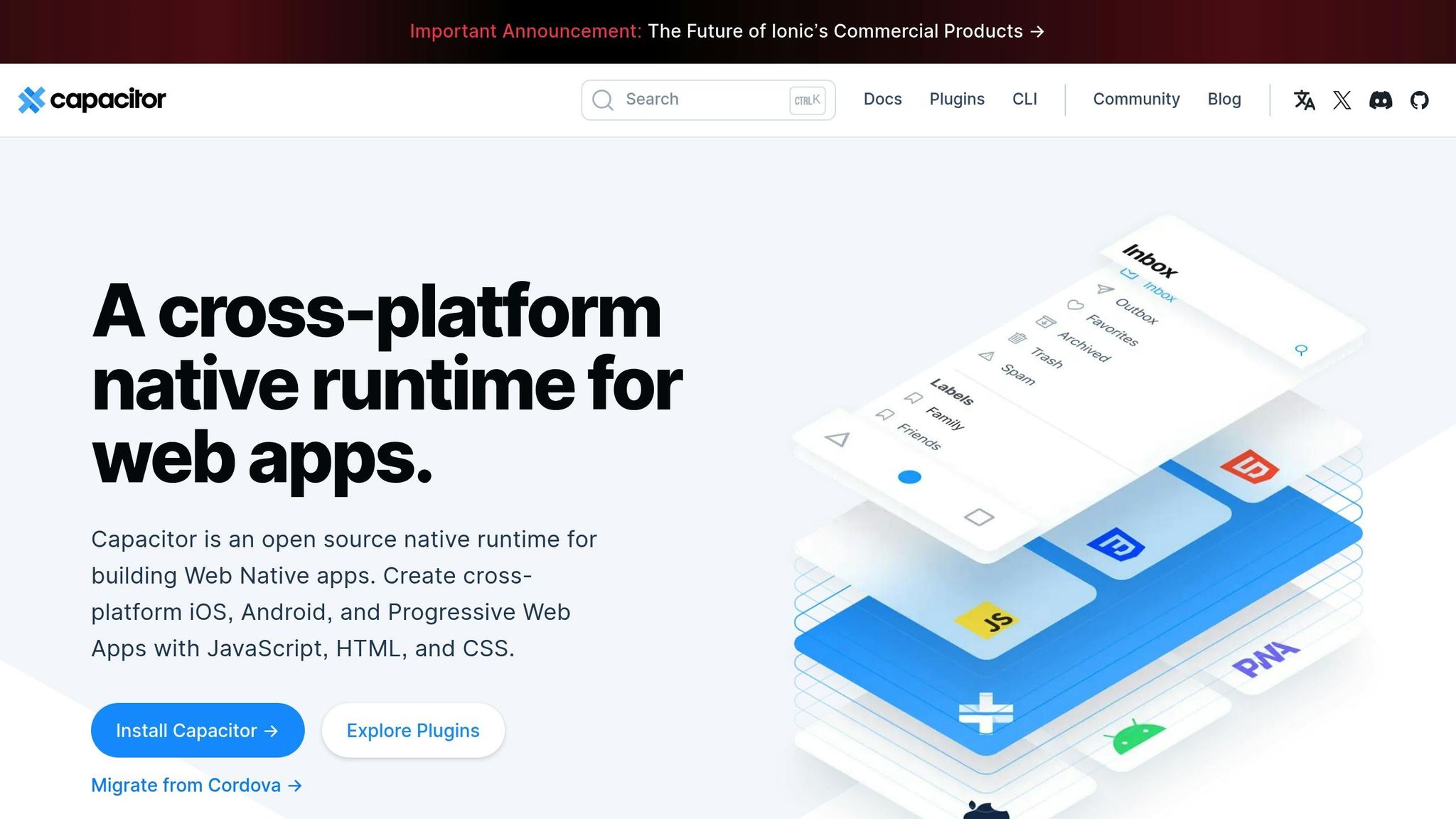
Built-in Update System
Capacitor’s update system lets developers deliver live bug fixes and new features directly to users, skipping the usual app store review delays. When properly set up, this system can reach up to 95% of active users within 24 hours [1]. It uses differential updates, which only download the changed parts of the code, saving bandwidth and speeding up the process. For instance, downloading a 5MB update via Capgo’s global CDN can take just 114 milliseconds [1]. This streamlined approach fits seamlessly into modern development workflows.
Development Tools Support
Capacitor’s update system works hand-in-hand with various development tools to simplify deployment. CLI tools make building and deploying updates easier, while compatibility with CI/CD platforms like GitHub Actions, GitLab CI, and Jenkins automates the entire process. Additional features like version control, error tracking, and analytics dashboards let developers monitor updates in real time, troubleshoot issues, and measure performance effectively.
Capgo Platform Features
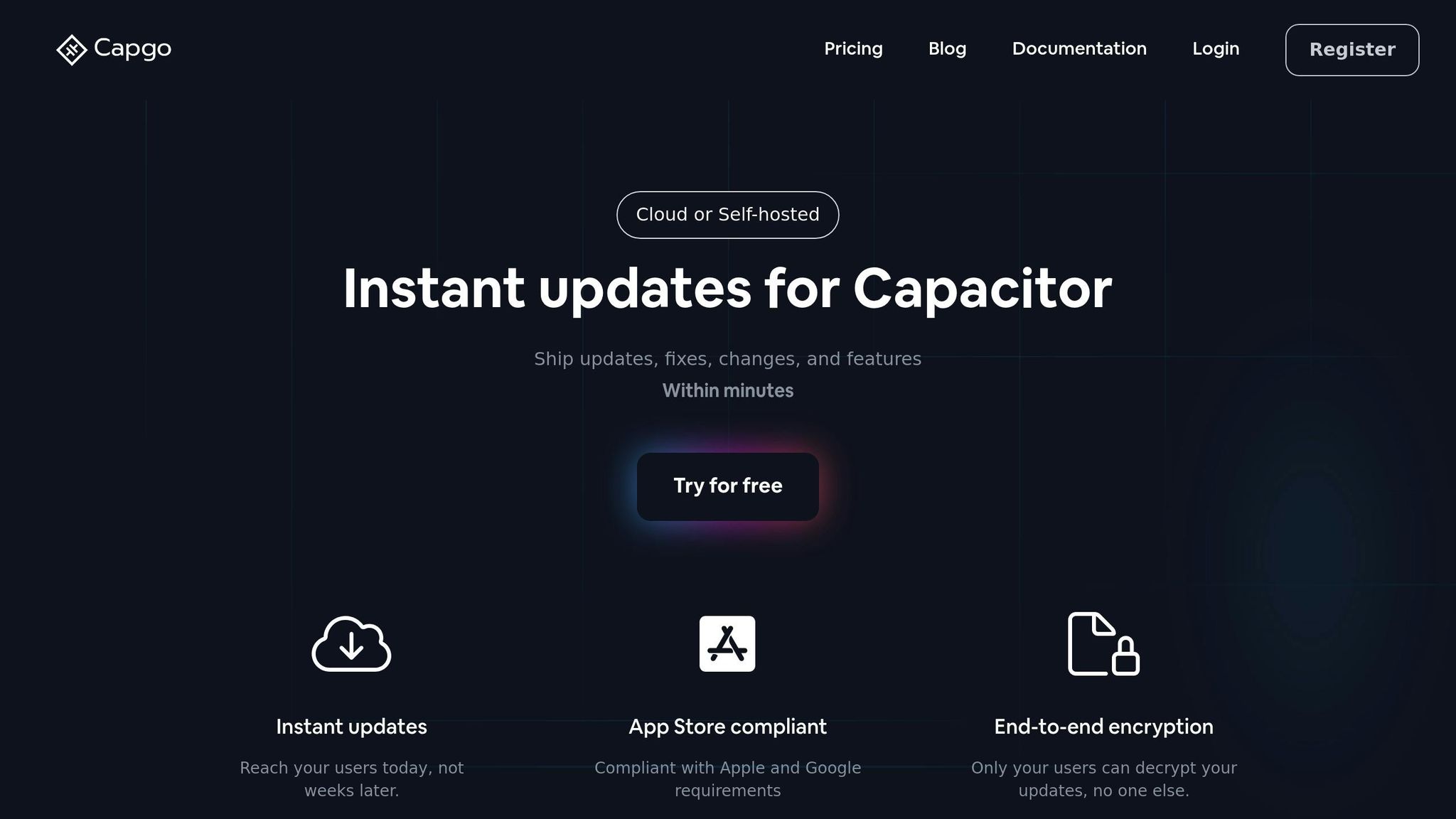
The Capgo platform enhances Capacitor’s update capabilities with added security and advanced deployment options. Having managed 23.5 million updates across 750 production apps [1], it provides key features to improve performance:
| Feature | Capability | Performance Metric |
|---|---|---|
| Update Success Rate | Global deployment | 82% worldwide |
| API Response Time | Real-time operations | 434 ms average |
| Security | End-to-end encryption | Full update protection |
| Distribution | Channel system | Targeted rollouts |
Capgo’s channel system enables precise update distribution, such as running beta tests or rolling out updates in stages, without compromising security. Teams can choose between cloud-hosted and self-hosted setups, gaining full control with tools like one-click rollbacks and proactive error monitoring.
Appflow Update System
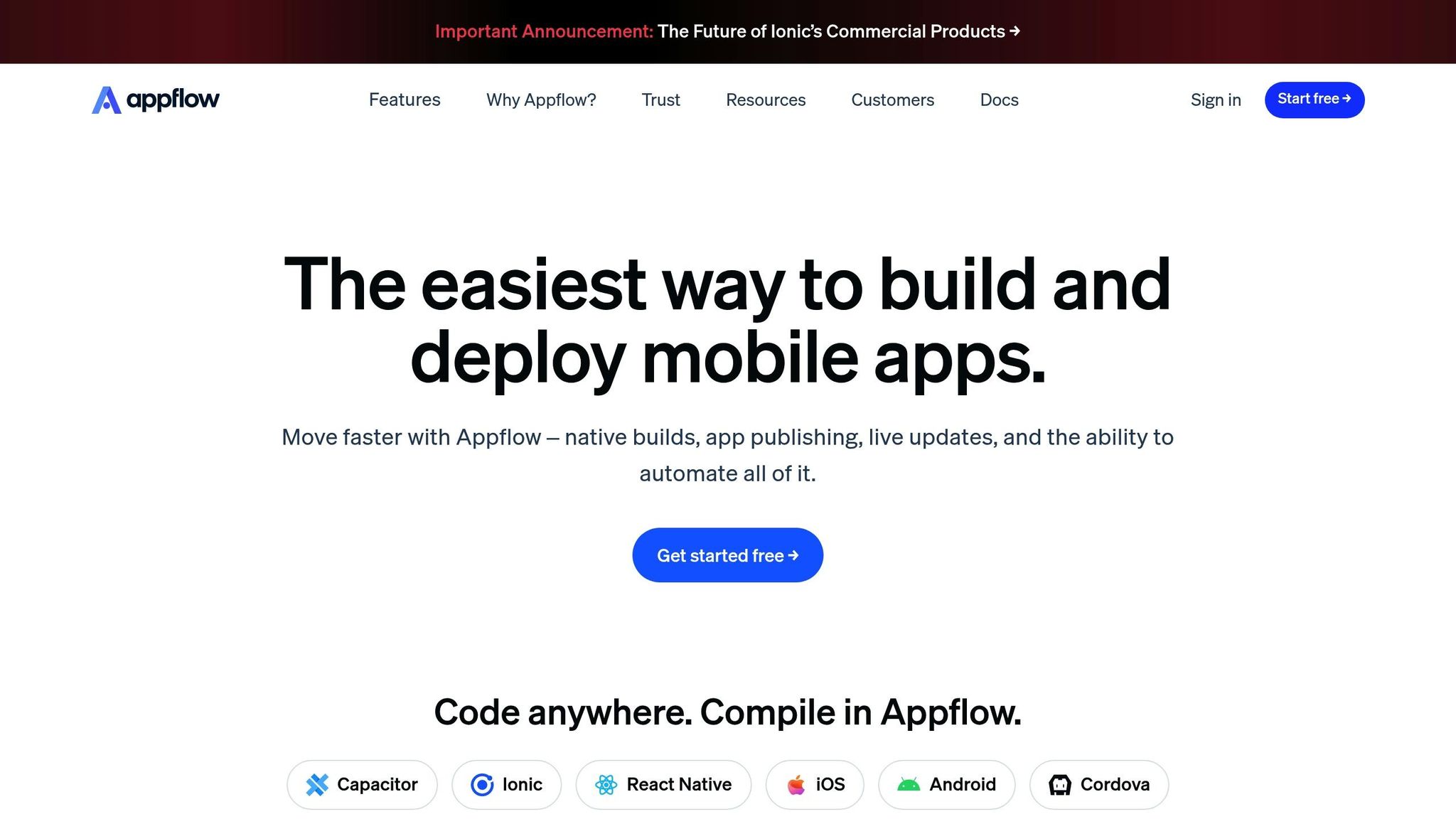
Ionic Platform Connection
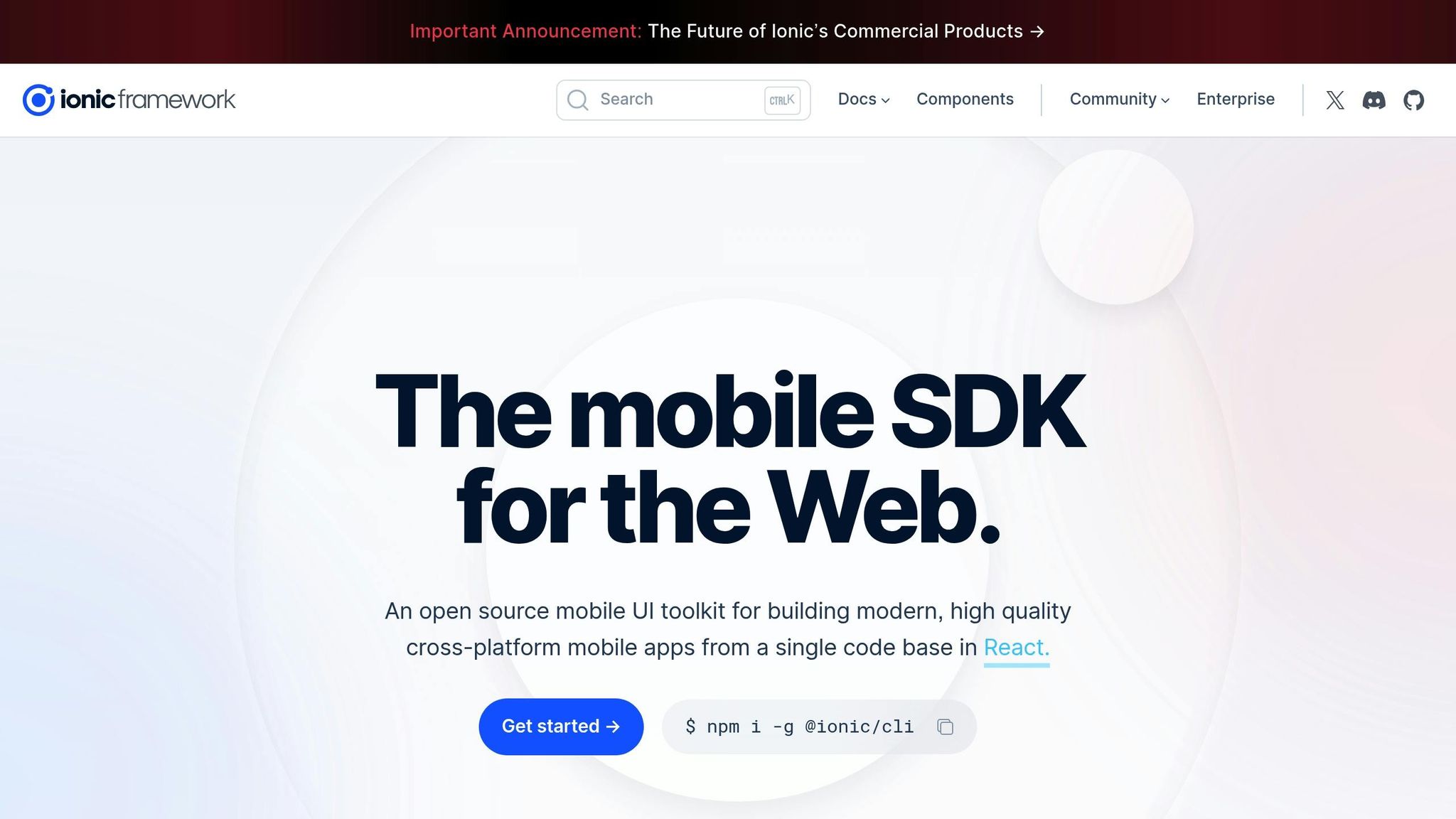
Appflow works directly with Ionic’s build system to package and distribute app updates efficiently.
Update Automation Tools
Appflow includes cloud-based tools for automating builds, managing pipelines, and handling version control. However, users have noted some challenges with its code-push functionality.
“Cancelled my @Appflow subscription after 4 years. Code-Push never seemed to work well, hopefully @CapGO has it figured out” - LeVar Berry [1]
Appflow End-of-Life Plans
Ionic has announced that Appflow will be discontinued in 2026, urging users to plan migrations now to avoid disruptions.
“Jumped over to @Capgo after @AppFlow hit us with a $5000 bill for the year to continue. Loving CapoGo so far. Thanks for @Capgo, it’s a great product.” - jermaine [1]
Platform Comparison
Here’s a practical breakdown of how these platforms perform based on their key features.
Feature Comparison Chart
This table highlights the main differences between Capgo and Appflow:
| Feature | Capgo | Appflow |
|---|---|---|
| Update Delivery Speed | 95% of users updated within 24 hours, 434ms average API response | Performance varies |
| Security | End-to-end encryption | Standard signing |
| Update Success Rate | 82% globally | Not publicly shared |
| CI/CD Integration | GitHub Actions, GitLab CI, Jenkins | Ionic-specific tools |
| Hosting Options | Cloud or self-hosted | Cloud-only |
| Platform Status | Active development | Support ends in 2026 |
| Annual Cost | From $144/year ($12/month for OTA) | $6,000 |
| Source Code | 100% open-source | Proprietary |
These distinctions can help guide your choice depending on your specific needs.
Best Uses for Each Platform
Each platform shines in different scenarios, making them better suited for particular use cases:
-
Capgo is ideal for:
- Fast deployment of critical updates, thanks to its quick download speeds.
- Environments where security is a priority, with its end-to-end encryption.
- Teams looking for lower long-term costs and flexible deployment options.
-
Appflow works well for:
- Users already invested in the Ionic ecosystem.
- Short-term projects that will wrap up before 2026.
- Teams relying on Ionic’s proprietary build system.
NASA’s OSIRIS-REx team shared their experience:
“@Capgo is a smart way to make hot code pushes (and not for all the money in the world like with @AppFlow) :-)” [1]
Capgo’s track record speaks for itself, with 750 production apps, 23.5 million updates delivered, and an 82% global success rate.
Developer Tools and Workflow
Setup Process
Setting up OTA updates varies by platform, but Capgo simplifies the process significantly. Developers can deploy updates in under 15 minutes using just a single CLI command. Here’s a comparison of Capgo’s setup process with Appflow’s more manual approach:
| Step | Capgo | Appflow |
|---|---|---|
| Initial Setup | Single CLI command: npx @capgo/cli init | Manual setup via dashboard |
| Configuration | Automated plugin setup and configuration | Manual configuration |
| Build Integration | Works with existing build workflows | Requires custom steps |
| Time to First Update | Under 15 minutes | Not specified |
“Did setup @Capgo and testing out this awesome replacement for @AppFlow! Thank you for the hard work, it has been easy so far. About to release to the app stores 🤞” - jaythegeek [1]
Capgo doesn’t just stop at setup - it further enhances the build pipeline with CI/CD integrations.
Build Pipeline Support
Following the quick setup, Capgo integrates effortlessly with widely-used CI/CD tools like GitHub Actions, GitLab CI, and Jenkins. This approach supports over 50 apps without locking developers into specific platforms. For teams needing automated CI/CD pipelines to build native mobile apps, an optional setup service is available for a one-time fee of $2,600 [1].
Update Management
Managing updates effectively is crucial for app performance and reliability. Capgo provides advanced tools to handle this, including:
- Channel Management: Ideal for beta testing, staged rollouts, and production releases.
- Version Control: Features like one-click rollbacks, real-time update analytics, error tracking, and pull request testing through specific channels.
- User Management: Offers detailed control over update distribution, beta tester management, permission-based access, and user group targeting.
Capgo’s error tracking ensures quick fixes and smooth updates, helping maintain app stability.
Security and Guidelines
Delivering updates securely is essential for maintaining compliance and earning user trust, especially when paired with strong deployment capabilities.
App Store Rules
OTA updates must align with app store regulations, integrating smoothly with the deployment workflows we’ve covered. Here’s how Capgo and Appflow handle these requirements:
| Requirement | Capgo | Appflow |
|---|---|---|
| App Store Compliance | Fully aligns with Apple guidelines | Meets standard criteria |
| Play Store Compliance | Follows Google Play requirements | Meets standard criteria |
| Authorized Decryption | End-to-end encryption for users | Update signing |
| Version Control | Detailed version management, including rollback | Basic version tracking |
Capgo ensures compliance with both Apple and Google OTA guidelines [1]. This strict alignment with store rules complements the CI/CD integrations discussed earlier.
Security Features
Security plays a vital role in OTA update systems, especially for live code deployments. Capgo stands out by offering advanced security measures that go beyond traditional solutions:
| Security Feature | Implementation |
|---|---|
| Encryption Type | End-to-end encryption |
| Update Protection | Decryption tailored to specific users |
| Access Control | Comprehensive permission controls |
| Hosting Options | Options for cloud or self-hosted setups |
| Version Rollback | Simple one-click rollback functionality |
These features ensure updates are encrypted, access-controlled, and reversible, offering enterprise-grade security while remaining easy to manage.
Price Comparison
Platform Costs
The cost of OTA update solutions can vary widely. Capgo offers plans starting at $12/month (Solo) and going up to $249/month (PAYG). Here’s a breakdown of their pricing:
| Plan | Monthly Cost (Billed Annually) | Key Features |
|---|---|---|
| Solo | $12 | 1,000 MAU, 50GB bandwidth |
| Maker | $33 | 10,000 MAU, 500GB bandwidth |
| Team | $83 | 100,000 MAU, 2,000GB bandwidth |
| PAYG | $249 | 1,000,000 MAU, 10TB bandwidth |
In comparison, Appflow charges a fixed annual fee of $6,000. This pricing difference has led many users to switch, including NASA’s OSIRIS-REx team:
“@Capgo is a smart way to make hot code pushes (and not for all the money in the world like with @AppFlow) :-)” [1]
These contrasting pricing models highlight the importance of evaluating costs alongside features.
Cost vs Benefits
Pricing is a major factor in choosing an OTA update solution, especially for long-term planning. Over time, the cost gap between Capgo and Appflow becomes more noticeable:
| Time Period | Capgo Total Cost (OTA only)* | Appflow Total Cost | Potential Savings |
|---|---|---|---|
| Year 1 | $144 | $6,000 | $5,856 |
| Year 3 | $432 | $18,000 | $17,568 |
| Year 5 | $720 | $30,000 | $29,280 |
*Capgo’s OTA update costs at $12/month ($144/year) [1]. Optional CI/CD setup service for building native apps available for $2,600 one-time (not included in table).
Jermaine shared his experience:
“Jumped over to @Capgo after @AppFlow hit us with a $5000 bill for the year to continue. Loving Capgo so far” [1]
For organizations focused on cost efficiency, Capgo’s lower monthly charges and self-hosting option can lead to significant savings over time.
LeVar Berry also shared his perspective:
“Cancelled my @Appflow subscription after 4 years. Code-Push never seemed to work well, hopefully @CapGO has it figured out” [1]
Final Analysis
Key Differences
When comparing Capacitor with Appflow, there are clear contrasts in update delivery and security features, as highlighted earlier. Capgo’s platform for Capacitor delivers fast and dependable performance [1]. It excels with its deployment options and strong security, including end-to-end encryption and the flexibility of cloud or self-hosted setups, which has driven adoption worldwide [1].
| Feature | Capgo (Capacitor) | Appflow |
|---|---|---|
| Security | End-to-end encryption | Basic signing |
| Hosting Options | Cloud and self-hosted | Cloud only |
| Future Availability | Actively developed | Ending in 2026 |
| Update Speed | 114 ms (5 MB bundle) | Not specified |
| Source Code | 100% open-source | Proprietary |
These differences play a big role in deciding which solution fits your needs.
Platform Selection Guide
Based on these distinctions, here’s a quick guide to help you pick the right platform:
-
Enterprise Organizations: If security is a top priority, Capgo is a strong fit. Its self-hosted deployment and end-to-end encryption meet strict security demands. Plus, it integrates smoothly with CI/CD tools, making it ideal for large-scale operations [1].
-
Growing Teams: Capgo’s scalable infrastructure and channel system allow for targeted updates to specific user groups, giving teams precise control over deployments [1].
-
Cost-Conscious Developers: With its competitive pricing, Capgo is a budget-friendly option compared to Appflow, making it suitable for teams of any size [1].
-
Planning for the Future: Appflow’s scheduled shutdown in 2026 means migration planning is essential. Capgo’s open-source approach, active development, and growing community make it a reliable long-term choice [1].

